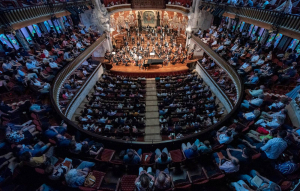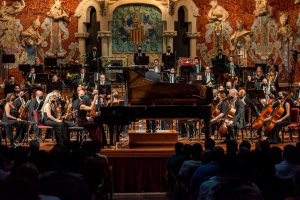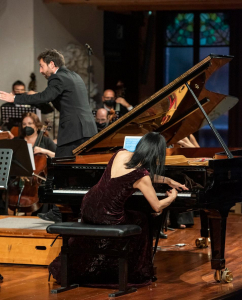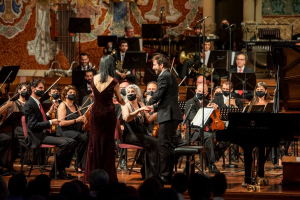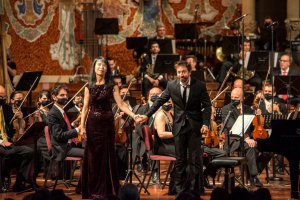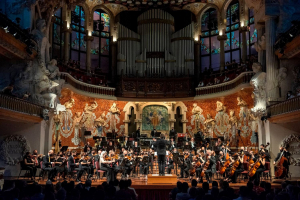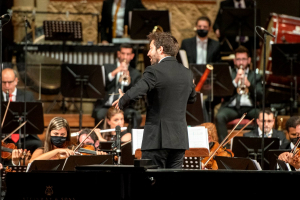Concert ‘John Williams, forever’ – Summary
On Monday, June 21, the Orquesta Sinfónica del Vallès – OSV conducted by composer Marc Timón, featuring pianist Gloria Cheng, performed at the Palau de la Música in Barcelona, Spain a tribute concert to maestro John Williams entitled ‘John Williams, forever’.
Previously we brought you a brief summary of the concert by Gorka Oteiza (read more), and now we bring you a complete and detailed article by our colleague and collaborator Coque Cano, exclusively for SoundTrackFest.
THE CONCERT
Marc Timón is in his own right a sensational composer, who is part of the unstoppable batch of young talents emerging in our country in recent years, and who seems to have inherited much better the ways of the American film music of the 80s and 90s than the same generation emerged in the US. In the same league as Velázquez, Baños, De la Riva, Palomares, Martín Jara, Vaillo, Bataller, Gil Inglada, etc. This is in terms of film music, because he has compositions for concert, for the musical genre, he is an accomplished and award-winning sardanist…
Of course, he is also a remarkable and dedicated orchestra conductor, with several concerts on his back despite his youth, in such emblematic places for music in Catalonia as the Auditori, the Gran Teatre del Liceu, and the Palau de la Música Catalana. Although until now we didn’t have the opportunity to listen to his cinematographic works in concert.
To finish this brief but necessary introduction, Marc Timón is also a journalist and a writer, and you only have to see him on stage to see his skills as a great communicator. All this and much more made him the ideal person to make history, as it happened last Monday.
And you may wonder why I say this if, after all, it was a concert dedicated to the works of John Williams (“John Williams forever” was its title), in which, of course, many of his best-known scores were played.
Well, because it was not really like that, but it was a tribute by Marc Timón to the work of Williams (with a special piece composed in his honor), and on a more relevant level, it was the first time that part of the works of the maestro (the Prelude – world premiere) and another part (the Scherzo – European premiere) were performed in our country.
To achieve this, we had the prestigious pianist Gloria Cheng, very close to Williams, for whom he has worked on several occasions in the recording of his scores (The Post, Munich or JFK among others), and to whom the Maestro gave the composition “Conversations” which is part of the essential album entitled “Montage”, which includes other themes for piano by Broughton, Desplat, Giacchino, Davis, and Randy Newman.
It was therefore quite an event and undoubtedly it lived up to expectations. That does not mean that there was nothing to improve, which, as in any other concert, there was, such as an appreciable but erratic (by the selection of the themes that composed it) Harry Potter suite, which was the one that was available for the occasion, or by cutting Leia or Yoda’s themes, which surprised us fans who have listened to them thousands of times, but which went completely unnoticed by the rest of the audience, which, let’s not fool ourselves, is the one that fills and therefore justifies that this type of concerts can be programmed, unless it is Williams himself who conducts.
In any case, it was a respectable option if these themes could be included in a very ambitious and complete program, although without surprises in that part, since it included the inevitable hits that Williams himself cannot avoid in his concerts. Except for Jaws, Close Encounters of the Third Kind or Superman (the latter also strangely missing in the last concerts of Williams himself), there we could find the bulk of his most popular scores.
Special mention to the interpretation of these pieces by the Orquesta Simfònica del Vallès (OSV), which under the baton of Marc Timón offered versions very close to the imprint of Williams, something that is often missing in thematic concerts of his work. Particularly noteworthy was the outstanding interpretation of ‘Schindler’s list’ by violinist Marta Cardona, which thrilled the entire Palau and had nothing to envy to that of Itzhak Perlman himself. Or a ‘Flying’ from E.T. brief but very faithful to the original. ‘Jurassic Park’ went in crescendo both in emotion and strength, and an ‘Imperial March’ that was perfect but… this piece is to Williams what the Radetzky is to Strauss, so it deserves to be apart in any concert, and at least to me, didn’t fit in the middle of a discontinuous “suite”, which did not allow the public to give what undoubtedly would have been one of standing ovations of that night.
The palpable proof that Williams demands a lot and needs a conductor with personality and affinity for his music was in the final encore with ‘Indiana Jones’. Where other conductors offer a blunt and flat march, Marc Timón gave it verve, a lot of intensity, and it was test of fire for an orchestra that he knew would respond. Chapeau!
And yes, I am not forgetting certain mistakes, especially the brass section in the highest fanfares of some pieces, but that is something that happens in all concerts, and even happened with the Vienna Philharmonic in the historic concerts of January 2020.
And so much for the most typical part, which is obviously always nice to hear in a tribute to Williams, but which, at least for me, was the part of the program that least caught my attention.
Without leaving the Maestro of Maestros, life sometimes gives us (via Gloria Cheng and Marc Timón in this case) a memorable moment, one of those that brings goosebumps. The world and European premiere of John Williams‘ “Prelude and Scherzo for Piano and Orchestra” was the highlight of the evening for its relevance as an event, but also for its quality and for the superb performance of the American soloist and the OSV.
A piece that effectively gains with the addition of the Prelude (as Cheng and Timón explained, it was she who encouraged Williams to compose it as a perfect complement to the Scherzo), and that shows us the Maestro form a torrent of ideas with very contemporary and atonal passages (I heard someone rightly comment that at times it seemed like a “Williams’ planet of the apes”), with constant dialogues between the orchestra and the piano and that, as a curiosity, was suspended on a note by Gloria Cheng due to the applause of the audience after a first attempt at a finale, that was not such. It was simply marvelous to see how, after such a complex and demanding performance, the pianist withstood the general applause to be able to give the required ending to the piece. I can think of no greater gesture of respect for both the music and the audience.
With this piece ended the intervention of this fantastic interpreter, who took advantage of the moment of the withdrawal of the piano to explain to the public the history of the Prelude and how it came to be premiered in Barcelona, all thanks to a small interview on stage conducted by the journalist that Marc Timón carries inside. A detail that was very interesting and that allowed us to put into context one of the most interesting concert works of John Williams’ career.
And I have left for the end the part of the concert dedicated to the work of the composer from Empordà, Marc Timón. Focused on three of his most spectacular scores (‘The Witches’, ‘The Little Wizard’, and ‘Coliseum’) and a concert piece entitled ‘The Beacon’ dedicated to Williams, whom he considers a reference in his career as a musician.
They were also premieres, given that they had never been performed in concert and especially ‘The Beacon’ was the first time that it jumped from the staves to the orchestra.
I do not hide the fact that I have always liked Marc’s work for its symphonism, thematic variety, and surrender to the ways of the great maestros of film music such as Williams himself, Basil Poledouris or Miklos Rozsa, but it must be recognized that the task of programming his own music in the framework of a tribute concert to John Williams was risky, especially considering that the vast majority of the audience was a complete ignorant of both Marc and his music. But he succeeded, and people left excited after enjoying Williams‘ music and at the same time impressed by the discovery of the talent of the composer born in Castellò d’Empúries.
The three suites he prepared for the occasion from his previous scores were actually formed by three separate themes from each of them, achieving a fresh sound of the most sumptuous and adventurous part of his work, which was really impressive. He started with “The Witches” (the first piece of the evening) and it was quite a statement of intentions of the path that the concert would generally take (with the exception of the Prelude and Scherzo for piano and orchestra and Schindler’s List): epic, adventurous, and romantic music, brilliantly orchestrated by its author and performed by the OSV. A delight.
Curiously, the concert continued with Williams’ premiere, to then led to Timon’s music with “Coliseum“, a suite that the composer introduced to the audience by making references to the work of Miklos Rozsa; references that can be noticed in a score that was composed for a Roman circus show, which also led him to put an eye on Zimmer, although the three pieces he programmed were not exactly the closest to the German composer’s style. Spectacular and elegant score that sounded perfect in concert and in which he included the beautiful theme composed for Cleopatra.
To finish with the suites, it was time for “The Little Wizard”, perhaps my favorite of the composer, with echoes of Poledouris, a slight medieval air, and the wonderful theme of the little wizard spreading magic around the Palau. The choice of the three themes, as in the two previous suites, was very successful and gave way to the second premiere of the evening, the theme with which Marc wanted to give his particular tribute to John Williams, very coherently entitled “The beacon“.
The composer initially approached this theme as a piece of contemporary music until he realized that this tribute cried out loud for an approach to the forms and film music work of Williams, and especially of the Williams who had guided him so much. The result, a 10-minute piece that is certainly indebted to and at the same time very respectful of the Maestro’s legacy, but that also has enough personality to not seem like a mere copy. Hopefully, someday it will be released because it is a joy from beginning to end and is both a beautiful love letter to -in my opinion- the best and most influential composer that cinema has ever produced, as well as a demonstration of Marc Timón Barceló‘s talent.
It is curious how capricious life can be, since the last concert that many of us who were last Monday at the Palau de la Música Catalana were able to attend, was precisely that of the Vienna Philharmonic conducted by John Williams, almost a year and a half ago, and then we did not even suspect what would come just a couple of months later.
The pandemic has caused that the late return to “normality” (obviously the capacity of the venue was limited), has been again with Williams as the protagonist, so this concert has been a double celebration and we must thank the coincidental meeting of Marc Timón and Gloria Cheng in a concert in Los Angeles, from which arose the alchemy necessary to make this evening possible. Thanks to both of them and of course to John Williams for agreeing to premiere his work in Barcelona. The standing applause of the entire Palau was undoubtedly the best finale to a special concert.
Article by Coque Cano
Pictures by Palau de la Musica


